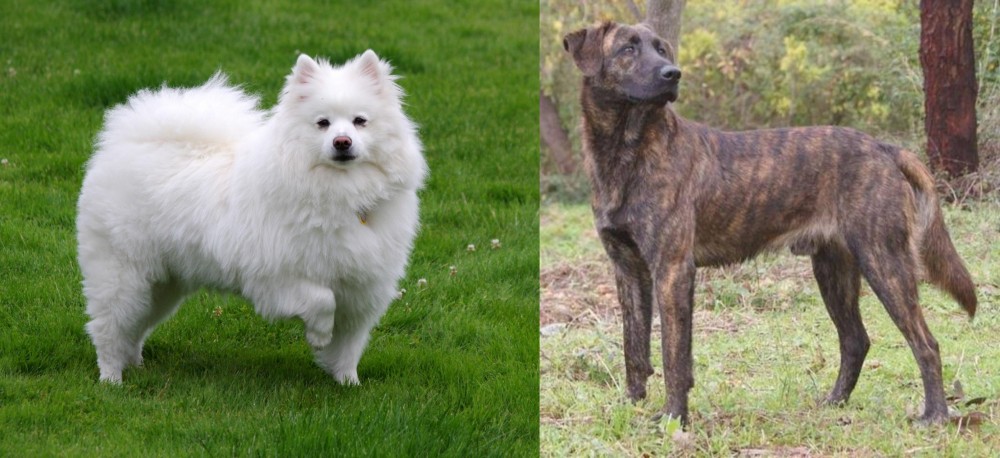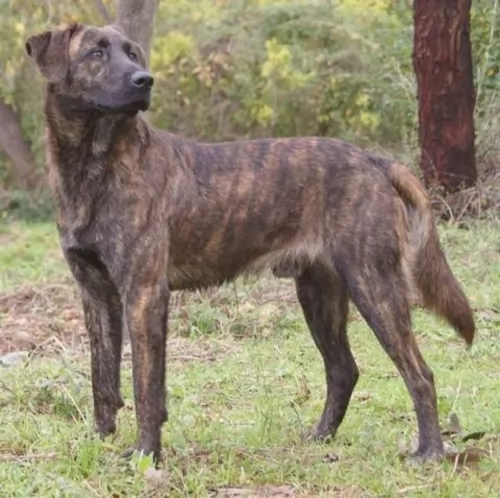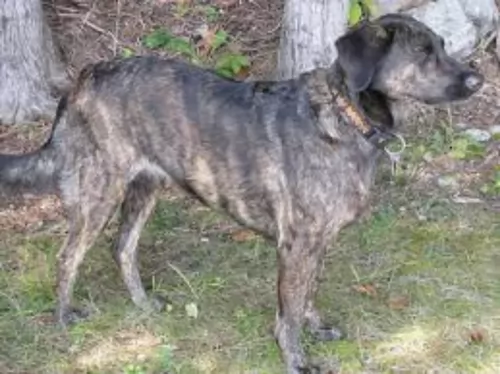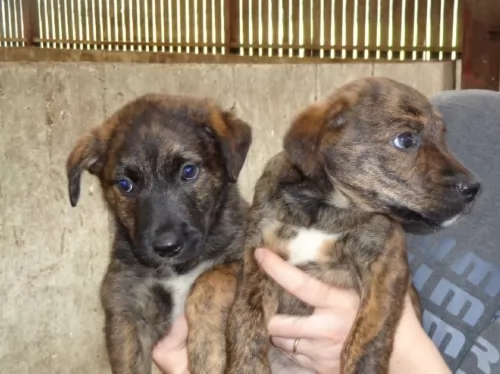 Petzlover
Petzlover Both American Eskimo Dog and Treeing Tennessee Brindle are originated from United States. American Eskimo Dog may grow 13 cm / 5 inches shorter than Treeing Tennessee Brindle. American Eskimo Dog may weigh 7 kg / 15 pounds lesser than Treeing Tennessee Brindle. American Eskimo Dog may live 3 years more than Treeing Tennessee Brindle. Both American Eskimo Dog and Treeing Tennessee Brindle has almost same litter size. American Eskimo Dog requires High Maintenance. But Treeing Tennessee Brindle requires Low Maintenance
Both American Eskimo Dog and Treeing Tennessee Brindle are originated from United States. American Eskimo Dog may grow 13 cm / 5 inches shorter than Treeing Tennessee Brindle. American Eskimo Dog may weigh 7 kg / 15 pounds lesser than Treeing Tennessee Brindle. American Eskimo Dog may live 3 years more than Treeing Tennessee Brindle. Both American Eskimo Dog and Treeing Tennessee Brindle has almost same litter size. American Eskimo Dog requires High Maintenance. But Treeing Tennessee Brindle requires Low Maintenance
 The American Eskimo is derived from the Nordic Spitz breed and most closely related to the German Spitz in particular. There were many German Spitzes in the United States at the time of the second World War and anti-German sentiment caused its name to change to the American Eskimo Dog. However, as the breed developed over time in the States, the American Eskimo became its own separate breed. In addition to the German Spitz, the American Eskimo is also related to the white Keeshond, the Samoyed, the white Italian Spitz and the white Pomeranian.
The history is beginning to show that the Spitzes that were brought to the US in the early 1900’s was white. This color was not popular in Europe but was quickly the favorite in the United States. They were originally working dogs on farms and ranches. They have excellent herding instincts, make goo watch and guard dogs, and good law enforcement sniff dogs. However, their first introduction to the American public was through the Cooper Brothers’ Railroad Circus and Stout’s Pal Pierre at the Barnum and Baily Circus. Eskimo puppies were sold after the circus show.
The American Eskimo is derived from the Nordic Spitz breed and most closely related to the German Spitz in particular. There were many German Spitzes in the United States at the time of the second World War and anti-German sentiment caused its name to change to the American Eskimo Dog. However, as the breed developed over time in the States, the American Eskimo became its own separate breed. In addition to the German Spitz, the American Eskimo is also related to the white Keeshond, the Samoyed, the white Italian Spitz and the white Pomeranian.
The history is beginning to show that the Spitzes that were brought to the US in the early 1900’s was white. This color was not popular in Europe but was quickly the favorite in the United States. They were originally working dogs on farms and ranches. They have excellent herding instincts, make goo watch and guard dogs, and good law enforcement sniff dogs. However, their first introduction to the American public was through the Cooper Brothers’ Railroad Circus and Stout’s Pal Pierre at the Barnum and Baily Circus. Eskimo puppies were sold after the circus show.
It was then that the breed became one of America’s favorite breeds and they quickly became house pets. Following World War II, Japan exported the Japanese Spitz into America and it was crossed with the Eskimo also. The American Eskimo Dog breed was not recognized by AKC until 1985. Still in 1958 there was no official breed club in the States but there were growing numbers of the dogs. It was not until 1970 did the National American Eskimo Dog Association (NAEDA) come into being. They collected the pedigrees of the first 1750 dogs to be AKC registered.
Since the American Eskimo Dog is not recognized internationally, those wishing to participate in international competition such as England’s prestigious Cruft’s Dog Show must register their dogs a German Spitz. Despite this the American Eskimo and German Spitz remain two very different breeds.
 There doesn’t seem to be 100% clarity on how the dog came about but it originated in USA. It appears as though it was only since 1995 that records have been maintained through the American Kennel Club's Foundation Stock Service Program.
There doesn’t seem to be 100% clarity on how the dog came about but it originated in USA. It appears as though it was only since 1995 that records have been maintained through the American Kennel Club's Foundation Stock Service Program.
A Reverend Earl Phillips, who was a writer for a hunting magazine became aware of a Brindle Cur with a brown coat and tiger stripes. In fact ‘treeing’ is a type of hunting, where the dog chases an animal into a tree to escape. He heard about the dog’s amazing hunting skills.
In the early 1960s, he later formed The Treeing Tennessee Brindle Breeders Association, designed to protect the breed. It was in 2013 that the dog got foundation stock status with the American Kennel Club, but isn’t registered with the American Kennel Club.
 This small to medium dog is beautiful and resembles a miniature Samoyed. There are three sizes of American Eskimo – the standard, miniature, and the toy. The Eskimo’s head is wedge shaped with tall, triangular, erect ears. It has a heavily plumed tail with a sharp curl over the back. The Eskimo can burst into bold action due to their good legs and feet.
This small to medium dog is beautiful and resembles a miniature Samoyed. There are three sizes of American Eskimo – the standard, miniature, and the toy. The Eskimo’s head is wedge shaped with tall, triangular, erect ears. It has a heavily plumed tail with a sharp curl over the back. The Eskimo can burst into bold action due to their good legs and feet.
The coat is a double one with a harsh outer coat and plush inner one. The coat is always white or white with cream or biscuit markings, and visible skin in gray or pink. The American Eskimo’s ruff or mane is very heavy, and the nose, eyelids, pads and gums are black. They have dark eyes and blue are not allowed.
 The Treeing Tennessee Brindle is a medium sized, deep chested breed of Cur, descending from the Old Brindle Cur dog.
The Treeing Tennessee Brindle is a medium sized, deep chested breed of Cur, descending from the Old Brindle Cur dog.
These strong dogs have a short, smooth brindle coat that is fairly soft to the touch. The coat's color is a mix of tan, black and a little bit of white.
He stands at between 41 and 61cm in height and weighs between 14 and 23kg both male and female. The Treeing Tennessee Brindle has a loud bark and it is best that this dog lives on a farm or in the suburbs as opposed to living in a small space in the city.
The Treeing Tennessee Brindle is a friendly, social dog and this is why he doesn’t make a particularly good watchdog.
He gets on well with children in the home as well as other dogs, not showing any aggression towards them.
They’re intelligent dogs and it will be a good idea to have them trained and socialized to make them well balanced and well behaved.
 The Eskimo is affectionate, playful and love children of all ages. They are intelligent and want to please you. They can be trained easily and are champions of the obedience trial. They are fun and confident. At the same time, they need a confident pack leader. He is prone to Little Dog Syndrome where the dog thinks they oversee the home and display all sorts of behaviors. Under these circumstances the American Eskimo can become obsessive, aggressive, and engaging in obsessive resource guarding and barking.
The Eskimo is affectionate, playful and love children of all ages. They are intelligent and want to please you. They can be trained easily and are champions of the obedience trial. They are fun and confident. At the same time, they need a confident pack leader. He is prone to Little Dog Syndrome where the dog thinks they oversee the home and display all sorts of behaviors. Under these circumstances the American Eskimo can become obsessive, aggressive, and engaging in obsessive resource guarding and barking.
 This brindle-colored cur dog is brave, intelligent and lively and his temperament allows him to be a good companion for his human family.
This brindle-colored cur dog is brave, intelligent and lively and his temperament allows him to be a good companion for his human family.
Even though they are friendly around strangers, they still make good watchdogs and will alert you to all kinds of visitors to your property. They do best in a home with large grounds and an active family where they can explore and sniff around. At the end of the day, they love to lie contentedly at your feet, a loyal, loving companion.
 The American Eskimo Dog is prone to hip dysplasia. Their eyes and tear ducts are potential issues with progressive retinal atrophy. They are allergic to fleas and have a tendency to be overweight.
The American Eskimo Dog is prone to hip dysplasia. Their eyes and tear ducts are potential issues with progressive retinal atrophy. They are allergic to fleas and have a tendency to be overweight.
We deal with PRA (Progressive Retinal Atrophy) in greater detain in a following section but it is not as destructive as it used to be. It is much more treatable now.
There are potentially some dental issues that some American Eskimo Dogs are prone to.
 The Treeing Tennessee Brindle is a robust, healthy breed. You’re not likely to battle with too many health issues with him.
The Treeing Tennessee Brindle is a robust, healthy breed. You’re not likely to battle with too many health issues with him.
Watch out for ear infections which are more common in floppy eared dogs. Other common dog diseases that you need to know about -
This is a viral disease which is highly contagious and with no known cure. It’s why there is a vaccine against it. Coughing, lethargy, high temperature and loss of appetite with vomiting are symptoms of this disease.
This is another highly contagious respiratory viral infection transmitted between dogs in close proximity to each other, like in kennels for instance.
Symptoms include coughing, sneezing, nasal discharge, breathing difficulties, lethargy and loss of appetite. It’s important to get veterinary assistance as pneumonia could set in.
 Your American Eskimo Dog needs a high quality food so they will not get overweight. Make sure you know how much is appropriate for your particular dog and her specific age. The puppies should be fed twice a day but adults only once.
Your American Eskimo Dog needs a high quality food so they will not get overweight. Make sure you know how much is appropriate for your particular dog and her specific age. The puppies should be fed twice a day but adults only once.
As previously mentioned the American Eskimo Dog is prone to eye issue such as Progressive Retinal Atrophy or (PRA) – this disease is inherited and used to cause blindness as the rods in the retina died. New medical discoveries mean this is no longer a hopeless disease. Their eyes are also susceptible to other issues so make sure you check them and the tear ducts regularly.
Like so many other breeds the American Eskimo is also susceptible to hip dysplasia and a moving patella in the knee. For this reason watch their weight. They can also be very allergic.
This small dog has more energy than his size can handle. He needs a lot of exercise and a place to run. If he will become hyperactive and destructive. They are prone to disturbing behaviors such as spinning (spinning in circles) when they don’t get enough exercise. The American Eskimo Dog is smart and agile, Play games like catch or agility. They are also great at herding, competitive obedience or detection.
 A brush once or twice a week will be sufficient for this dog. Look inside his ears for signs of redness which could indicate an ear infection. Make sure his eyes are still bright and not red and with a pus discharge. Trim his nails too.
A brush once or twice a week will be sufficient for this dog. Look inside his ears for signs of redness which could indicate an ear infection. Make sure his eyes are still bright and not red and with a pus discharge. Trim his nails too.
The Treeing Tennessee Brindle is a high energy dog and he is going o want more than just a walk every day, although he will love that and rely on you for this daily outing.
He will also want ball games and hide and seek games.The breed needs an active owner who will take him on long walks and hikes.
Whenever you opt to give a dog commercially manufactured dog food, you need to check that the dog food is made with high-quality ingredients which are mostly made up of protein or meat.
Certainly a puppy will need protein in his food for proper growth and he will require 4 bowls of food a day. An adult dog will require 2 bowls of food a day.
The type of commercial dog food you buy will depend on the age of your dog as well as his activity levels. If your dog has a known allergy or illness, there are dog foods manufactured with that in mind.
Try and in include some homemade food into his diet. Nothing spicey and exotic as this can cause stomach problems. A good guide is boiled chicken, brown rice and vegetables.